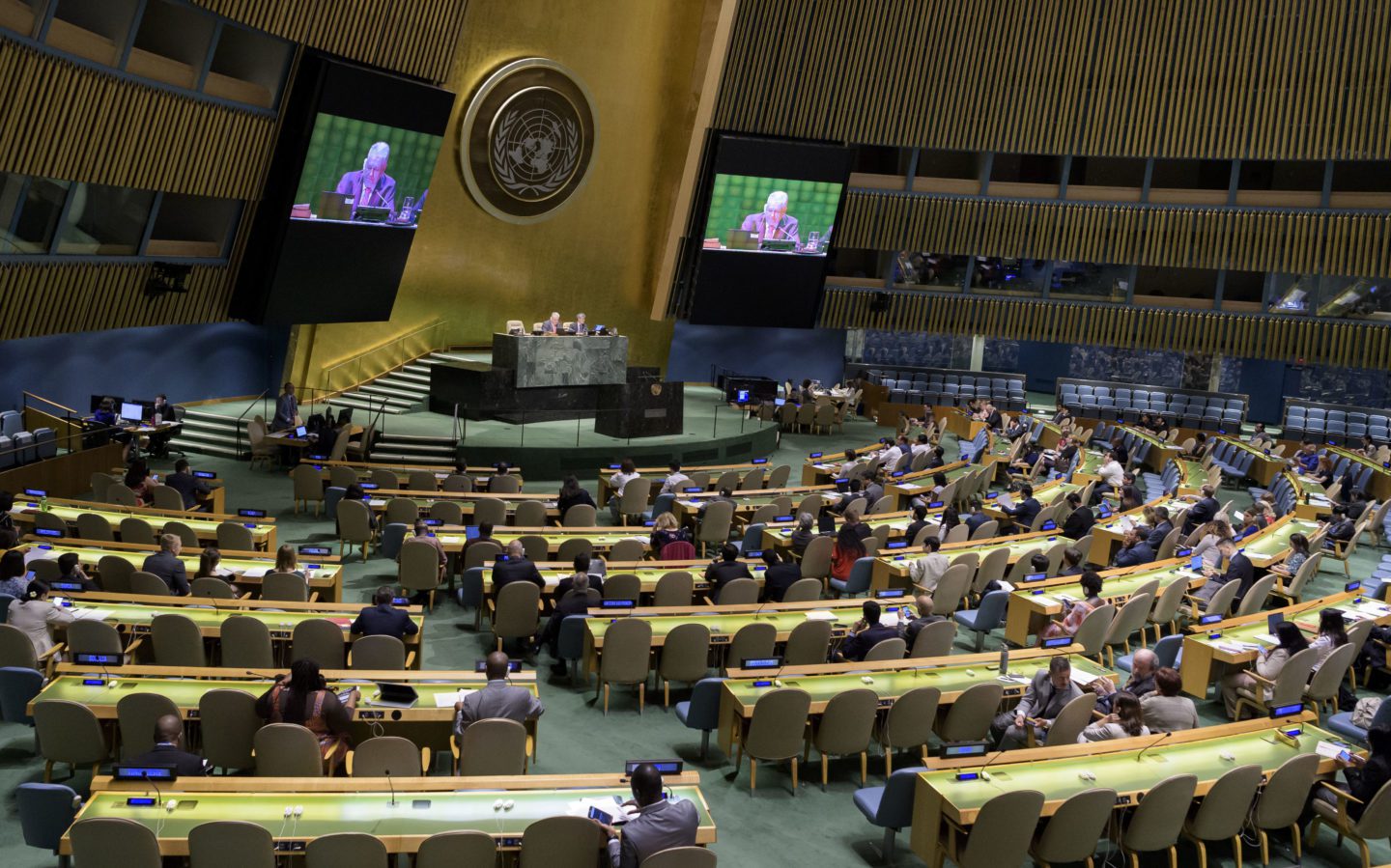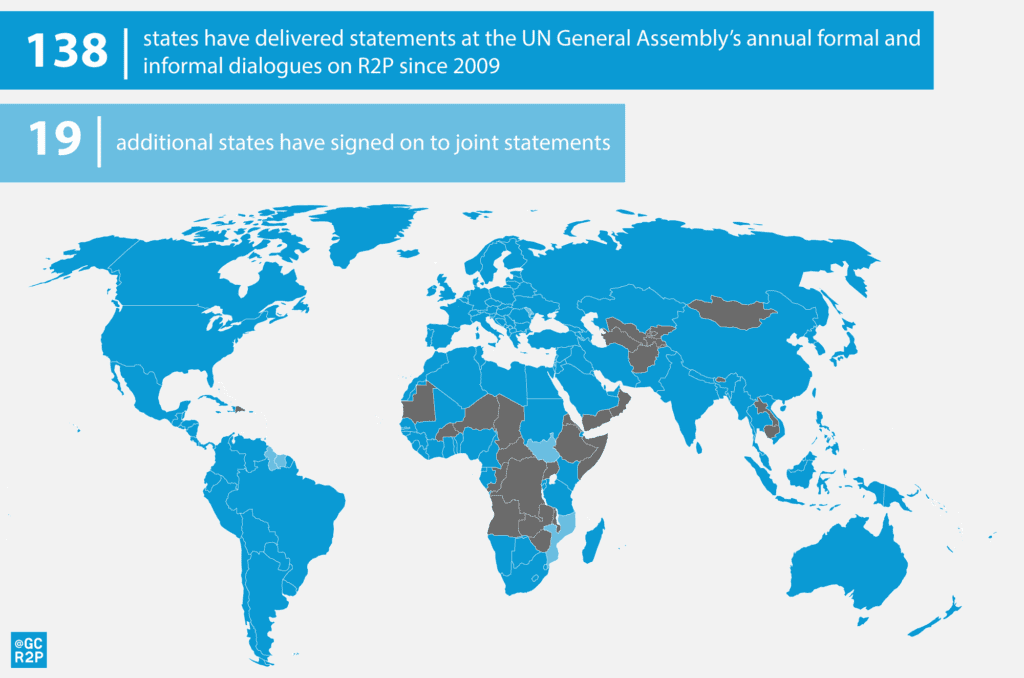

Engagement with the entire UN membership is crucial for achieving broad support for the prevention of mass atrocities and the implementation of R2P. Since its inception in 2008 the Global Centre has worked with UN member states in the UN General Assembly to help strengthen consensus on the Responsibility to Protect, promote the development of the norm, and encourage states to uphold their individual and collective responsibilities to the prevention of genocide, war crimes, crimes against humanity and ethnic cleansing.

Since 2009 the General Assembly has held either a formal debate (2009, 2018, 2019, 2021, 2022, 2023, 2024) or informal interactive dialogue (2010-2017) on R2P following the publication of the UN Secretary-General’s annual report on the norm. Ahead of the meeting, the Global Centre coordinates an annual advocacy campaign aimed at bolstering the participation of UN member states, as well as provides suggested talking points for national statements. Global Centre staff also help organize consultations between states and the UN Secretary-General’s Special Adviser on the Responsibility to Protect prior to the publication of the report.
The Global Centre played a key advocacy role in supporting efforts by states to include R2P on the formal agenda of the General Assembly. In 2021 the Global Centre played an important advocacy role for the passage of Resolution 75/277, which formalized the inclusion of the debate on the General Assembly’s agenda. The formal debate had a number of procedural benefits compared to the informal interactive dialogue format. Formal debates allocate more time for member state interventions and provide an opportunity for states to have an on-the-record exchange regarding best practices on the prevention of, and response to, atrocities. This also enables the General Assembly to maintain a full record of the response of states to the Secretary-General’s annual report on R2P.
The Global Centre produces an annual summary of the General Assembly’s meeting, as well as the Secretary-General’s report. Links to statements delivered by individual states during the 2010-2017 informal interactive dialogues are also available on our resources page.
Every year the opening of the General Assembly in September provides the Global Centre with an opportunity to highlight developments regarding R2P and discuss strategies for the prevention of mass atrocity crimes. The Global Centre, alongside member states and civil society organizations, co-hosts a number of events each year and our staff also deliver statements at other high-level events.
Since 2008 the Global Centre has hosted an annual Ministerial Meeting on R2P. The meeting brings together a cross-regional group of states to discuss the future of R2P and has become an important event for governments committed to ending mass atrocity crimes. This gathering provides an important opportunity for UN member states to reaffirm their commitment to R2P and to engage in dialogue on preventing mass atrocity crimes and protecting vulnerable populations.
Since 2015 the Global Centre has also co-hosted a number of other side-events during High-Level week connecting R2P to related initiatives. Such events have focused on the Security Council Code of Conduct and veto restraint in situations of mass atrocities, the role of religious leaders in the prevention of mass atrocity crimes, the protection of cultural heritage, peacekeeping and civilian protection, international justice and accountability for sexual violence in conflict, and hate speech, Women, Peace and Security, as well as on strategies for bridging the gap between NY and Geneva.
The General Assembly’s Third Committee, one of its six Main Committees, is responsible for agenda items related to social, humanitarian and cultural matters, including human rights. Systematic or widespread human rights violations and abuses often serve as early warning signs of potential mass atrocity crimes. In turn, effective atrocity prevention strategies must begin with the protection and promotion of fundamental human rights, a central component of the Third Committee’s work. The Global Centre supports this effort by providing member states with targeted recommendations and talking points for country-specific debates and broader thematic discussions.
The Global Centre has been an active member of myriad coalitions of civil society organizations that regularly convene to discuss justice and accountability issues for populations who have endured mass atrocities. This includes a civil society coalition working to codify the draft Crimes Against Humanity treaty. As part of this coalition the Global Centre has worked with colleagues to share updates on the process, collaborate on strategic advocacy efforts and share insights on each organization’s ongoing work. The Global Centre has utilized the International Coalition for the Responsibility to Protect to share opportunities for collaborative advocacy efforts on the Crimes Against Humanity treaty, encouraging coalition members to join the advocacy initiatives. To guide our advocacy strategy and identify target states, the Global Centre has also conducted research into the positions of various states following the second resumed session of the Sixth Committee of the UN General Assembly in October 2024. This research also examined how states perceive the treaty within the context of prevention.

Ralph Bunche Institute for International Studies
The Graduate Center, CUNY
365 Fifth Avenue, Suite 5203
New York, NY 10016-4309, USA